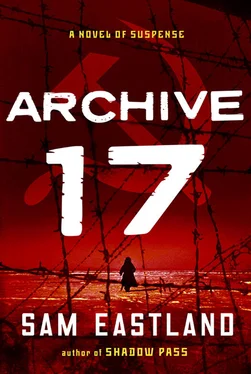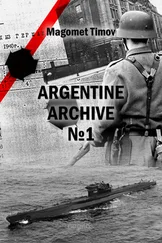Sam Eastland - Archive 17
Здесь есть возможность читать онлайн «Sam Eastland - Archive 17» весь текст электронной книги совершенно бесплатно (целиком полную версию без сокращений). В некоторых случаях можно слушать аудио, скачать через торрент в формате fb2 и присутствует краткое содержание. Жанр: Исторический детектив, на английском языке. Описание произведения, (предисловие) а так же отзывы посетителей доступны на портале библиотеки ЛибКат.
- Название:Archive 17
- Автор:
- Жанр:
- Год:неизвестен
- ISBN:нет данных
- Рейтинг книги:3 / 5. Голосов: 1
-
Избранное:Добавить в избранное
- Отзывы:
-
Ваша оценка:
- 60
- 1
- 2
- 3
- 4
- 5
Archive 17: краткое содержание, описание и аннотация
Предлагаем к чтению аннотацию, описание, краткое содержание или предисловие (зависит от того, что написал сам автор книги «Archive 17»). Если вы не нашли необходимую информацию о книге — напишите в комментариях, мы постараемся отыскать её.
Archive 17 — читать онлайн бесплатно полную книгу (весь текст) целиком
Ниже представлен текст книги, разбитый по страницам. Система сохранения места последней прочитанной страницы, позволяет с удобством читать онлайн бесплатно книгу «Archive 17», без необходимости каждый раз заново искать на чём Вы остановились. Поставьте закладку, и сможете в любой момент перейти на страницу, на которой закончили чтение.
Интервал:
Закладка:
“We can’t afford to wait for dark,” replied Kolchak. “Everything must happen now.”
After gathering fallen branches, they heaped the deadfall over the place where the crates had been buried. Using scrolls of birch bark peeled from the nearby trees, they soon had a fire burning. Then they stood back, watching nervously as the smoke climbed up into the sky.
Looking like a creature sculpted from ice and soot, Gramotin wandered through the forest. The trees seemed to be closing in on him. I’ve been out here too long, he thought. I think I am losing my mind.
In the distance, Gramotin saw what he thought at first was a cloud drifting in from the east, but soon he realized it was smoke. Why they would have stopped and made a new camp again so soon after leaving the old one, Gramotin had no idea. They must think no one is following them, he told himself. And to light a fire in broad daylight struck him as an arrogance which could not go unpunished. Encouraged, Gramotin pressed on, the weight of his rifle and ammunition bandolier dragging on his shoulder blades.
Later, when he paused to catch his breath, he noticed a pack of wolves skulking among the trees, their fur a grayish-purple haze against the maze of birches. A jolt of fear passed through him, but he choked it down. Hoping they would keep their distance, he quickened his pace. After that, whenever Gramotin stopped, the wolves stopped. When he moved on, they followed. Each time, the gap between him and the wolves grew smaller.
An image barged into Gramotin’s head of his old platoon, lying strewn and half devoured on the ground. A blinding anger flared inside him. He unshouldered his rifle, hooked his left arm through the leather strap, and braced his hand against the forward stock. Closing his left eye, he squinted down the notches of the gun sight and picked out the lead wolf. At this range, he thought, even a lousy shot like me can’t miss. To calm himself before pulling the trigger, Gramotin breathed in the comforting smell of armory oil sunk into the wooden stock and the familiar metallic reek of gunpowder from the breech of the Mosin-Nagant.
But then Gramotin hesitated, knowing that the men he was pursuing would be close enough to hear the gunfire. Even though the group had split up, they still outnumbered him. His only chance would be to catch them by surprise. Slowly, he lowered the gun. When the notched sights of the rifle slid away from the wolf’s face, Gramotin realized the animal was staring right at him. It seemed to be mocking the sergeant’s presence, as if daring him to pull the trigger.
Gramotin reshouldered his gun and moved on.
Soon afterwards, as he rounded a bend in the tracks, a cliff rose up to his left. To his right, across a frozen pond, the smoke he had seen earlier was rising through the forest canopy. Leaving the path of the railroad, Gramotin scrabbled up the sloping ground beside the cliff until he reached a clearing near the precipice. Then he got down on his belly and crawled the rest of the way, dragging his rifle by its strap. From here, the footprints of the Comitati were clearly visible crossing the snow-covered pond. In the trees on the other side, Gramotin could just make out a group of men standing beside a fire.
As quietly as he could, Gramotin slid back the bolt of his gun.
Unable to wait any longer, Tarnowski waded into the flames, scattering the burning branches and emerging seconds later with two shovels. In their years beneath the ground, roots had taken hold of the handles. Now they clung like skeletal hands to the wood.
Kolchak reached out for one of the shovels.
With a smile, Tarnowski held it out of reach. “Allow us, Colonel.”
“By all means, gentlemen!” Kolchak stepped aside.
Tarnowski and Lavrenov, each now armed with a shovel, marched into the smoke and began chiseling out clods of earth still crystallized with frost. Lavrenov’s shovel, weakened by its years under the earth, broke almost immediately. But this did not slow him down. Grasping the metal blade of the shovel, he dropped to his knees and attacked the frozen ground.
Now that the two men were occupied with digging, Kolchak turned to Pekkala. “Walk with me,” he said.
They strolled out onto the surface of the frozen pond.
“How does it feel to be free?” asked Kolchak.
“I’ll tell you when I know,” said Pekkala.
“There is something else I wanted you to know as well. Even though that gold is almost in our grasp, our work is not yet done.”
“Yes. We have to get across the border.”
“I am talking about more than that. What I mean is that you and I still have important roles to play in the shaping of our country’s future.”
“Once we cross the border, this will not be our country anymore.”
“That is precisely why we will be staying only as long as it takes to acquire weapons. We will then be returning to Russia and, within six months, my uncle’s dream of an independent Siberia, which he died trying to fulfill, will be a reality.”
Pekkala was thunderstruck. Kolchak had gone completely mad. “An independent Siberia? With what ghost army are you planning this invasion? Or are we to manage this just by ourselves?”
“Not ghosts, Pekkala. Refugees.” Kolchak’s voice was trembling with energy. “Just across that border there are more than two hundred thousand men who fled Stalin’s Russia. They are soldiers and civilians who had made lives for themselves in Siberia, but who were forced to flee into China during the Revolution rather than surrender to the Reds. I am talking about the Izhevsk Rifle Brigade, the Votkinsk Rifle Division, the Komuch People’s Army, and my uncle’s own Siberian Provisional Government troops. Some of them took their families with them.”
“And haven’t they made new lives for themselves?”
“Of course, but they have kept alive the dream of returning to their native country. They all want the same thing, Pekkala-to return home to the richest land in all of Russia.”
“Even if what you say is true,” replied Pekkala, “and these refugees were prepared to fight, what makes you think you could defeat the Red Army?”
“The Russian military is busy in Poland. Soon, if the rumors in Shanghai are true, it will be defending its borders against Germany. They will have neither the time nor the resources to stand up to us.”
“And suppose you did take Siberia? What then?”
“Then we form an alliance with Germany. The land west of the Ural Mountains will belong to them, and everything to the east will belong to us.”
“What makes you think the Germans would agree to this?”
“They already have,” explained Kolchak. “Their diplomatic representatives in China have promised to recognize us as a legitimate government as long as we can reclaim Siberia, which means that Japan will automatically recognize our new frontier as well.”
“And which country is providing the weapons for this adventure?”
“The men I’m speaking of are not concerned with politics.”
“You mean you are dealing with gunrunners.”
“Call them whatever you want, Pekkala. Even as we speak, there are two ships moored in a cove in the Sea of Okhotsk, loaded with rifles, machine guns, even a few pieces of artillery. All we have to do is pay for them. And when we get across the border into Russia, what we do not have-more guns, food, horses, whatever the gold has not bought-we’ll take from those who try to stop us.”
Even though Pekkala had now recovered from his initial shock, he was still astounded at the audacity of Kolchak’s plan. Under any other circumstances, such an insurrection could not stand a chance against the massed forces of the Soviet military, which Stalin would not hesitate to use if he felt that his power was threatened. But Kolchak’s timing had placed him in the center of a chain of events which might soon engulf the whole world. If his prediction of a German invasion was correct, Stalin might not be able to prevent a determined opponent from occupying Siberia. No one would understand this better than Stalin himself, whose own party had come to power in the closing stages of the Great War, when the Tsar’s army was crippled by defeats against Germany. Had the Bolsheviks chosen any other moment, their own uprising might never have succeeded, but with a combination of ruthlessness and popular support, they had taken over the whole country.
Читать дальшеИнтервал:
Закладка:
Похожие книги на «Archive 17»
Представляем Вашему вниманию похожие книги на «Archive 17» списком для выбора. Мы отобрали схожую по названию и смыслу литературу в надежде предоставить читателям больше вариантов отыскать новые, интересные, ещё непрочитанные произведения.
Обсуждение, отзывы о книге «Archive 17» и просто собственные мнения читателей. Оставьте ваши комментарии, напишите, что Вы думаете о произведении, его смысле или главных героях. Укажите что конкретно понравилось, а что нет, и почему Вы так считаете.











